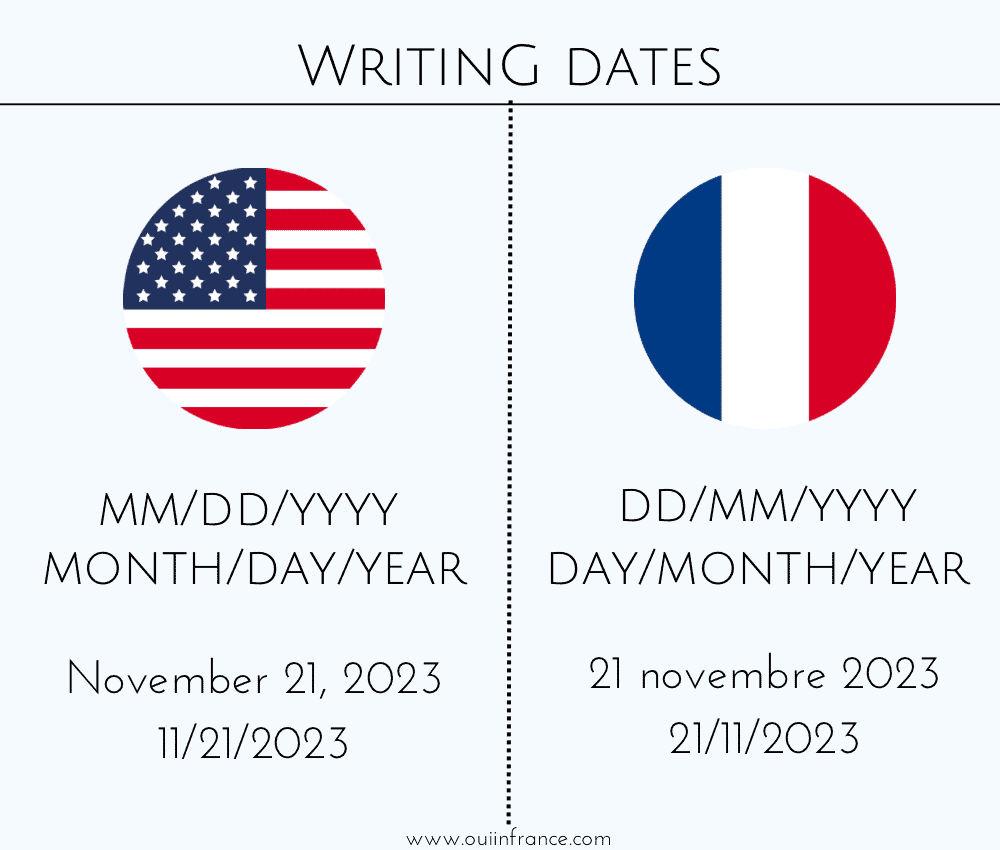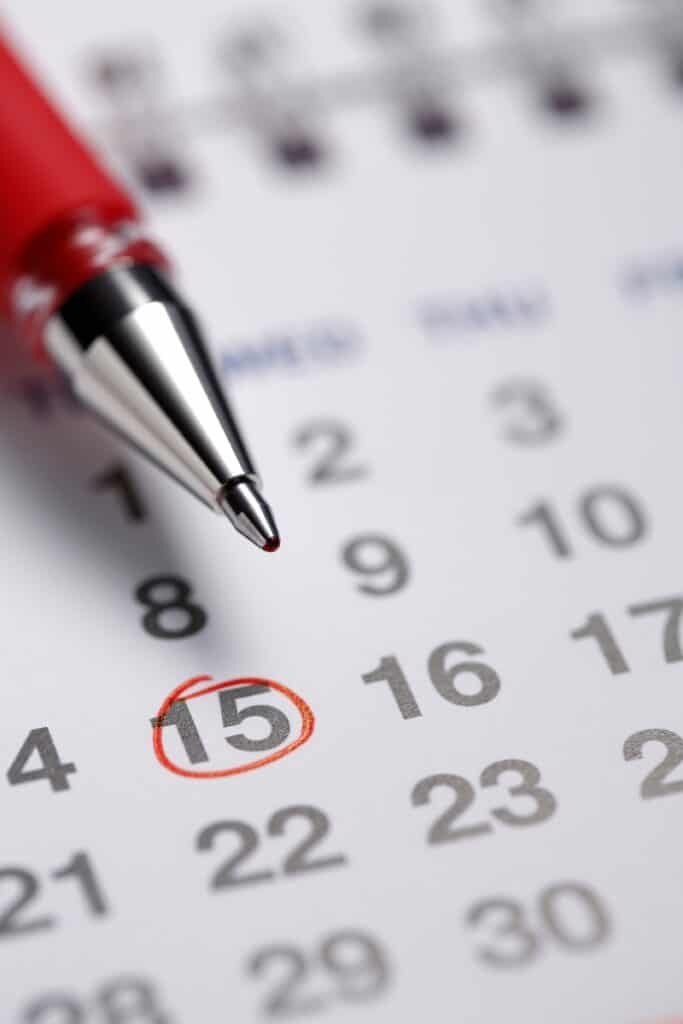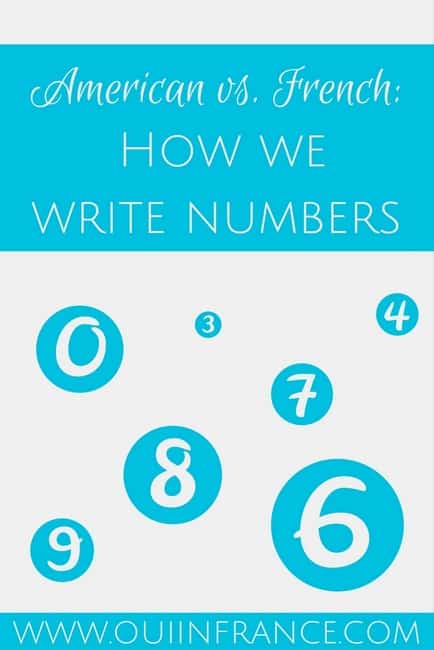Bonjour, mes amis! If you’ve ever wondered how to write a date in French, you’re in the right place. Whether you’re planning a trip to a French-speaking country, learning the language, or looking to expand your cultural knowledge, understanding how to express dates in French is important. It’s different than how we do it in the U.S., and even after a decade of living in France, I still double check when I’m reading and writing a French date.
How to write a date in French
Numbers were the bane of my existence the first couple of years in France when trying to get a handle on this beautiful foreign language. From the stress of learning numbers over 70 (yes, they get tricky), to being able to decipher French handwriting, to the learning curve of saying and writing French phone numbers in real time, numbers can throw a French beginner for a loop.
To help you get a little bit more comfortable with all things numbers, let’s turn to how the French write dates.
Let me walk you through the basics of writing dates in French, including the format, pronunciation, and some common phrases you can use.
1. The basic French date format
In the United States, the date format we use is MM/DD/YYYY. The American format is the month, followed by the day, followed by the year. In France and most other European countries, dates are written in a slightly different format.
In France, the format is day/month/year (JJ/MM/AAAA). For example, today’s date in French is September 28, 2023 it it would be written 09/28/2023 in the U.S. but it would be 28/09/2023 in France. That’s the main difference.
Also, in the U.S., sometimes we’ll drop the zero for months and days under 10 and shorten the year (9/27/23) but in French, months and days smaller than 10 are always written with the 0. So it’s 27/09/2023.
People sometimes shorten the year to the last two digits like we do in the U.S.
The reason for this format is because in French, you say the date leading with the day first. For example, it’s le 21 novembre. Saying the date with the month first, novembre 21 isn’t an option in French like it would be in English.
In English, we can say something like “we’re leaving on the 21st of November” or “we’re leaving November 21st.” Both would be correct. Not in French.
For French dates that contain days on the 12th or before, I take extra care to make sure I’m understanding the French date correctly since it’s easy to mistake days 1-12 for the month if you aren’t paying attention. It’s easy to recognize my birthday 31/12/2023 as December 31 since there are only 12 months and it’s clear that 31 is the day.
But in the case of Tom’s birthday, which is September 8, I always make sure I’m not writing August 9 by accident. His birthday is 08/09/2023 in French. But if you aren’t familiar with the French date format or you read it or write it quickly, you might be tempted to write 09/08/23, which is August 9th in France (and September 8 in the U.S.).
Transposing the numbers accidently used to happen more my first couple of years in France, but eventually you get the hang of it and the French way becomes second nature.
Seems simple enough, right? Writing and saying dates in French is a breeze! But wait, there’s more.
2. Months in French
To write dates in French accurately, you’ll need to know the names of the months as well. Here’s a list of the months in English and their French translations. Note that in French, months are always lowercase and not capitalized like in English (same with days of the week). No capital letter is needed.
Listen to my French husband Tom pronouncing the months (just press the play button icon):
– January: janvier
– February: février
– March: mars
– April: avril
– May: mai
– June: juin
– July: juillet
– August: août
– September: septembre
– October: octobre
– November: novembre
– December: décembre
3. Pronunciation
Now that you know the format and months, let’s talk about how to say the dates in French. Pronouncing dates is relatively straightforward, but there are a few things to keep in mind:
– When saying the day of the month, use “le” before the number. For example, “le vingt-cinq” means “the twenty-fifth.” So le 25 novembre.
– When saying the month by itself, you don’t need to use “le” before it. For example, “janvier” is simply “janvier” and not “le janvier.”
– When saying the year 2023, it’s typically said deux-mille-vingt-trois (which is two thousand twenty three. You do not say vingt vingt-trois (20, 23).
Putting it all together, you would say the full date “le vingt-deux janvier deux-mille vingt-trois” for January 22, 2023.
4. Some common phrases
Now that you can write and pronounce dates in French, here are a few common phrases you might find useful:
– Aujourd’hui, c’est le 5 septembre 2023. (Today is September 5, 2023.)
– Mon anniversaire est le 11 juillet. (My birthday is July 11th.)
– Le 1er janvier, c’est le jour de l’an en France. (January 1st is New Year’s Day in France.)
– Le 14 février, c’est la Saint-Valentin. (February 14th is Valentine’s Day.)
– We’re going there from September 10-15. On y va du 10 au 15 septembre. (it’s du because you’re saying “from the,” which is de+le=du, and au because it’s à+le=au)
–Quel jour sommes-nous aujourd’hui ? (“On est/nous sommes quel jour aujourd’hui” is heard in everyday informal French) This is asking, “What day is today?” Note that one way of asking what day it is in French is literally phrased as “we.” We are what day today?). You can also say: Quelle est la date aujourd’hui ? (What is the date today?) Note that in French, there’s a space before the question mark.
-For the first day of the month, such as le 1er janvier, note that it’s always an ordinal number (first) and not a cardinal number (one) in both written in spoken French. My example there is pronounced “le premier janvier” and not “le un janvier.” For the second and so on, use cardinal numbers (ordinal numbers aren’t used).
Also note that there’s never a “de” like we’d use “of” in English. We don’t say “the first of January” (le 1er de janvier) in French. It’s “le premier janvier” (no of)
5. Variations and regional differences
It’s worth noting that while the day/month/year format is the most common in France, there are variations in other French-speaking countries. For instance, in Canada, it’s common to see the day/month/year format with hyphens instead of slashes (e.g., 25-01-2023).
6. Abbreviations for months of the year
In informal writing and speech, you may encounter abbreviations for months in French. Here are the abbreviated forms of the months:
– Janvier: janv.
– Février: févr.
– Mars: mars
– Avril: avr.
– Mai: mai
– Juin: juin
– Juillet: juil.
– Août: août
– Septembre: sept.
– Octobre: oct.
– Novembre: nov.
– Décembre: déc.
Using these abbreviations can save you time and space when writing dates casually.

Photo credit: www.depositphotos.com / ciaobucarest 26410275
7. French days of the week
While we’re on the topic of time, let’s not forget the days of the week (les jours de la semaine). Here are the days of the week in French.
You can listen to Tom pronouncing the names of the days of the week (just press the play button):
– Monday: lundi
– Tuesday: mardi
– Wednesday: mercredi
– Thursday: jeudi
– Friday: vendredi
– Saturday: samedi
– Sunday: dimanche
If you’re saying the day of the week, you don’t use “le” before it. It’s just, “Aujourd’hui, c’est jeudi” (Today is Thursday). Note: The only exception when you put “le” before a day on its own is if you’re saying that something happens regularly on Mondays, for example. “I only work on Mondays” is Je ne travaille que le lundi. Sometimes you’ll hear people say “les lundis” as well.
You can use days in conjunction with dates and it would look like this.
Today is Friday, September 29, 2023. Aujourd’hui nous sommes le vendredi 29 septembre 2023.
8. Use preposition “en” to mean “in”
If you want to say you were born in December, use en for “in.” You’d write and say Je suis né(e) en décembre. The same goes for the year. Je suis née en 1987. Don’t use dans (which means “in” but in other contexts).
***
Voilà! You’re well on your way to becoming a pro at writing dates in French just like French people do. Whether you’re jotting down your travel itinerary, making plans with a French-speaking friend, or simply learning more about the beautiful French language and culture, knowing how to write dates in French is a valuable addition to your language skills.
Remember to practice writing and pronouncing dates to become more comfortable with the format and French pronunciation. As with any language, practice makes progress and you’ll gain confidence along the way.
Hope you enjoyed learning how to write the date in French. Go on and make your French teacher proud!
PIN my how to write a date in French post:









Well for me as a swedish person we have a third variant. We starr with the year then the month than the day so today is 2023-09-27. Lol
Korean is done the same as the Swedish order.
Fun article…. Perhaps it was mentioned and I missed it, as a side comment: the week starts on Monday in France. And all the calendars are that way. It drove me crazy when I moved to the US. I so wanted to use French calendars, but it was so confusing that I gave up,
Et oui, je compatis pour tous vos efforts pour vous habituer à la façon de vivre en France. Vos articles me font très plaisir. (50 ans aux US !)
Monique (Seattle)